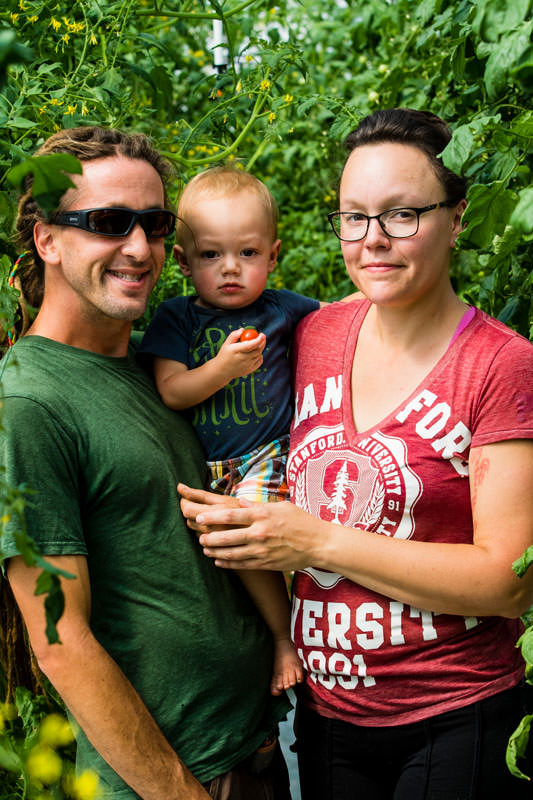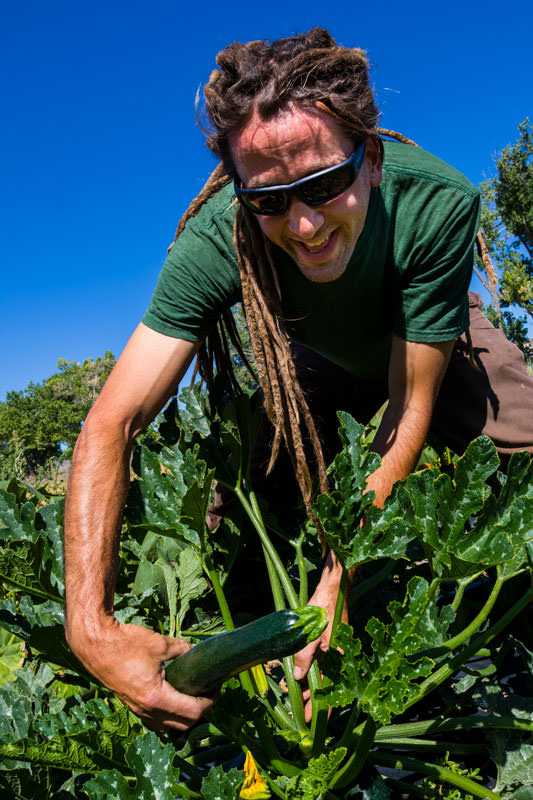Bee Here Now Farm transitions from urban farming to rural acreage.
The life trajectories of Nick Hill and Christine Rosakranse have been heavily shaped by Nevada’s extraordinary landscape, from the dusty playa of Black Rock City, where the couple first met at Burning Man, to the fertile acreage in Wadsworth, cut by the Truckee River, where they now operate Bee Here Now Farm.
In 2017, after moving from California, where Rosakranse completed her Ph.D. in communications at Stanford University, to Reno to be closer to Hill’s family in Sparks, the couple decided to try their hand at urban farming.
“One of the big things that started it was that Nick felt a very strong call toward serving people,” Rosakranse explains. “He likes to listen to (spiritual teacher and psychologist) Ram Dass, who recently passed away, and one of the things that Ram Dass says is that if you want to help the world, feed people.”
Thus, Bee Here Now Farm was born — its name a riff on the name of Ram Dass’ 1971 book, Be Here Now, which deals with spirituality, yoga, and meditation. And despite the name, the two don’t — Rosakranse clarifies for the umpteenth time — keep bees at the farm, though they appreciate bees’ invaluable contribution as pollinators.

Raising a Farm
Bee Here Now Farm’s first growing season took place in the couple’s front yard and a few other yards around Reno; they planted quick-growing crops such as leafy greens and radishes. Like many city growers, Hill and Rosakranse followed the high-rotation method touted by The Urban Farmer author and consultant Curtis Stone.
As first-time growers, they educated themselves through online courses and farm visits arranged by the Great Basin Community Food Co-op in Reno. Hill handles the day-to-day operations on the farm, including building greenhouses and irrigation systems, while Rosakranse manages the bookkeeping, starting the seedlings, and minding their 2-year-old son, Xavier, during the day.
“It’s a big learning process. You can spend your entire life perfecting the art of being a farmer,” Rosakranse says. “Our fellow farmers are very forthcoming with sharing information. The market is so wide open, people aren’t worried about having a competitive advantage.”
In 2018, out of a desire to broaden the variety of produce they could grow and build their forever home, the couple purchased four acres of land in Wadsworth along the Truckee River. It previously had been used to farm alfalfa but hadn’t been planted in nearly a decade.
“It’s a microclimate and a little more humid because it’s in the river bend. Compared to Reno, it’s usually a little bit warmer, so you can plant things about two weeks earlier, which is nice,” Rosakranse explains.
Now in their second year of farming in Wadsworth, they have learned what does well in their area and are diversifying their crops.
“We’re going to have cherry tomatoes, beefsteak tomatoes, and slicer tomatoes — tomatoes do well in our particular area — and different types of peppers,” Rosakranse says. “We’re trying to expand the amount of long-term things we’re growing and taking a note from Lattin Farms (in Fallon), so we’re going to be growing cantaloupes, honeydews, and watermelons, which is completely new for us. We’re also expanding our squash production as well as onions and leeks.”
On the Horizon
For their own personal consumption — and perhaps to sporadically add as a bonus to their community-supported agriculture boxes — Hill and Rosakranse have started a food forest on their acreage. Food forests mimic the spatial and functional design of naturally occurring ecosystems, with edible trees, bushes, and perennial plants.
“We have fruit trees, berry bushes, asparagus, strawberries, and elderberries, so that’s our passion project because we don’t have enough produce to sell, but eventually, hopefully, we will,” Rosakranse says.
In the future, as they continue to build out the property, they are looking into the possibility of growing and producing tea.
Working the land and providing people with food have given Hill and Rosakranse a life that centers on mindfulness and service, just as they’d hoped.
“One of the things that’s surprising is that a lot of people want to help. It seems like people understand that there’s a niche to fill in this area, and it’s something that’s personally satisfying for them — to say they’ve contributed something positive to the world,” Rosakranse says. “There’s always more we can do, but right now we feel like farming is one of the most important jobs in the world.”
Claire McArthur is a freelance writer and wannabe homesteader who finds these stories of people jumping headfirst into their agricultural dreams incredibly inspiring. You can reach her at Clairecudahy@gmail.com.
For details, visit Beeherenowfarm.com. You can find Bee Here Now Farm products at the Great Basin Community Food Co-op in Reno, as well as several Reno restaurants, including Beaujolais Bistro and Campo.


